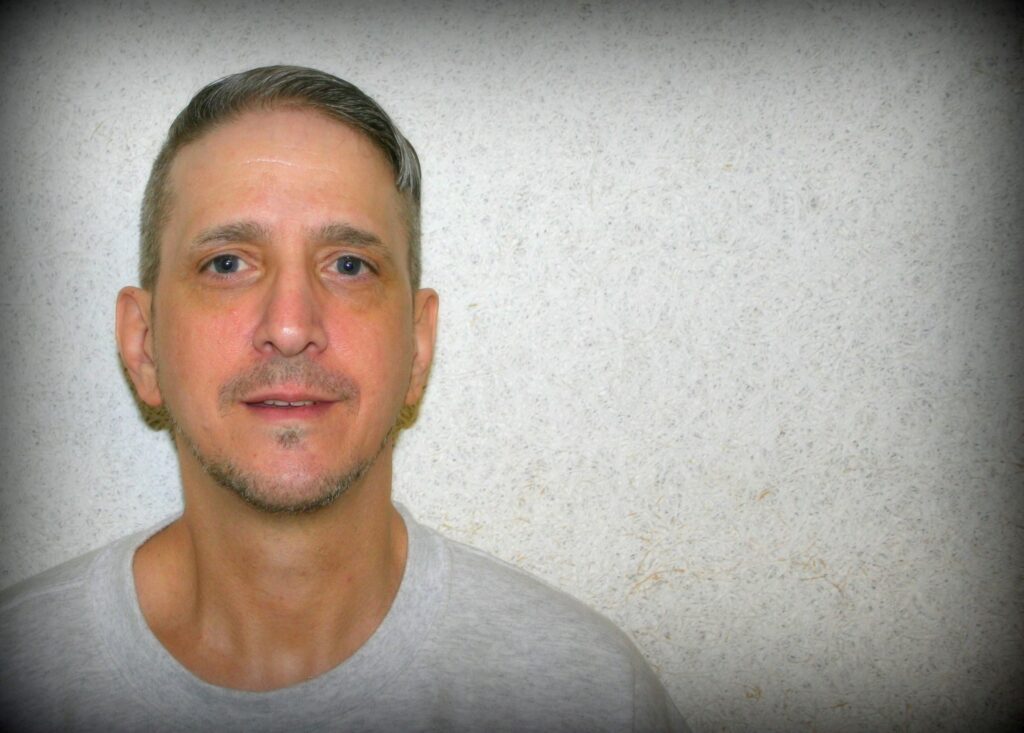Supreme Court Set To Hear Arguments in High-Profile Oklahoma Death Row Case
Richard Glossip has received nine execution dates, eaten three ‘last meals,’ and endured years of legal proceedings.

The Supreme Court is set to hear arguments on Wednesday in a high-profile execution case involving an inmate who has spent more than two decades on death row, Richard Glossip, in which the state’s Republican attorney general has conceded that the inmate didn’t get a fair trial.
It’s a rare case that has attracted national attention, as even pro-death penalty Republican lawmakers have been urging the high court to send Glossip’s case back for a new trial. “There has never been an execution in the history of this country where the state and the defense agreed that the defendant was not afforded a fair trial,” as a Republican state representative, Kevin McDugle, said of the case.
Glossip, who has maintained his innocence since his arrest, was convicted in 1998 of commissioning the murder of his employer, Barry Van Treese, who owned an Oklahoma City motel where Glossip worked. Although all parties agreed that Glossip himself didn’t commit the physical murder — another employee, Justin Sneed, pleaded guilty to beating him to death — the dispute at hand revolves around Sneed’s testimony, in which, as part of his plea deal to avoid the death penalty, he said that Glossip had offered him money to commit the murder.
The Oklahoma Court of Criminal Appeals reversed the decision finding Glossip guilty of first-degree murder and remanded the case for another trial in 2001, finding that the evidence at trial had been “extremely weak” — but in 2004, Glossip was again sentenced to death after a jury trial. He has since received nine execution dates, eaten three “last meals,” and endured years of legal proceedings — including a 2015 case before the Supreme Court, Glossip v. Gross, in which the justices held that lethal injections using a sedative called midazolam wasn’t cruel and unusual punishment.

Glossip’s conviction relied heavily on Sneed’s testimony that he had been offered money to commit the murder, but now, two investigations have cast doubt on the conviction. One of those investigations, commissioned by Oklahoma’s Republican attorney general, Gentner Drummond, found that the state had withheld evidence that Sneed was diagnosed with bipolar disorder and prescribed lithium, calling his mental state — and thus, his testimony about Glossip — into question. That new evidence led Oklahoma to conclude that “justice requires setting aside Glossip’s conviction and remanding the case to the district court,” but the state’s Court of Criminal Appeals refused to do so, writing that “Glossip has exhausted every avenue and we have found no legal or factual ground which would require relief in this case.”
Now, the Supreme Court will have a chance to hear arguments in the case, which will be unique since both sides in the case are arguing for a new trial. The Supreme Court has appointed a third lawyer to argue on behalf of the Oklahoma Court of Appeals and its decision to uphold Glossip’s death sentence.
“I am aware of no other cases where the Attorney General of a state has agreed with the defendant that the defendant did not receive a fair trial, and the court, the highest court in that state, continued to push for the execution anyway,” one of Glossip’s lawyers since 2015, Don Knight, tells the Sun.
“What the attorney general has admitted is that there was information in the hands of the prosecutors that should have been disclosed to Mr. Glossip’s lawyers before his trial, and that was withheld,” he says, adding that the evidence, now emerging 26 years later, would have likely helped the jury determine that Sneed wasn’t a reliable witness.
Additionally, Sneed testified that he had been given the lithium “maybe for a toothache, or maybe because he had a cold,” Mr. Knight says, and the prosecutor “knew that to be untrue, but did nothing about that and let that information go to the jury.”
“That is also a violation of Mr. Glossip’s due process rights under a case called Napue v. Illinois, which says that prosecutors, when they put a witness on and they know that witness is lying, they must and they have a duty to correct that witness. All of that is because prosecutors do not have a duty to win. They have a duty to do justice.“
Mr. Drummond’s office, when reached by the Sun, declined to comment beyond his previous statements, in which he said that he “cannot stand behind the murder conviction and death sentence of Richard Glossip” and that he does “not believe that justice is served by executing a man based on the testimony of a compromised witness.”
An amicus brief filed on behalf of the murder victim’s family members says that the family has an interest in seeing the death sentence carried out and that any further delay “would inflict enormous suffering” to the family and argues the case isn’t within the Supreme Court’s domain.
“At bottom, Glossip asks this Court to adopt the novel theory that, when a state Attorney General personally disagrees with a decision below, that unhappiness trumps all other procedural requirements,” the brief reads. “This Court has no authority to give decisive weight to the Attorney General’s views over the OCCA’s — and there is no reason to do so given the trauma that any further delay would inflict on the victim’s family.”

